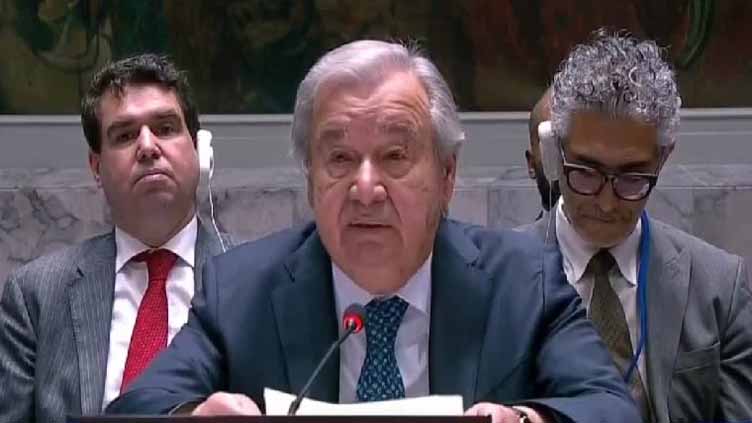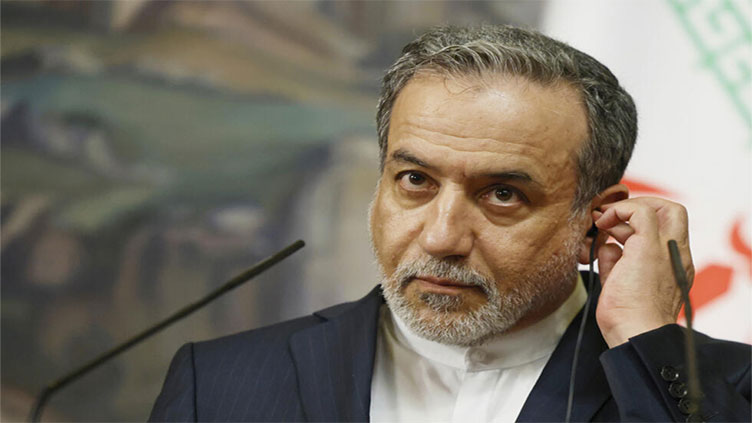UN chief urges immediate Iran-Israel ceasefire as war continues

World
Iran launched at least one new barrage of missiles early on Friday
JERUSALEM/DUBAI/WASHINGTON/GENEVA (Reuters/AFP/Dunya News) - United Nations Secretary-General António Guterres called for an immediate ceasefire between Iran and Israel, warning that escalating tensions could spiral out of control.
Addressing a UN Security Council session on the Iran-Israel conflict on Friday, Guterres emphasized that Iran has repeatedly stated it is not pursuing nuclear weapons.
He urged all parties to give peace a chance.
“If the situation escalates further, it may slip beyond anyone’s control,” Guterres warned. “I call for an immediate halt to hostilities and urge both sides to return to the negotiating table.”
He further stated that the Security Council must send a clear message of peace, noting that civilians on both sides are suffering due to the ongoing conflict. “We demand an immediate ceasefire from both countries,” the UN chief said.
Earlier, Iranian Foreign Minister Abbas Araqchi said that Iran was attacked while negotiations on its nuclear program were underway.
Addressing the Human Rights Council in Geneva, Abbas Araqchi said that an unjustified war was imposed on the Iranian people and that Israel attacked our facilities.
He said that Iran is defending itself against Israeli barbarity, that Israel attacked residential areas and hospitals in Iran, and that it is determined to defend its territorial integrity and sovereignty with force.
Iran said that it would not discuss the future of its nuclear programme while under attack by Israel, as Europe tried to coax Tehran back into negotiations and the United States considers whether to get involved in the conflict.
A week after it began attacking Iran, Israel's military said it had carried out new strikes on dozens of military targets overnight, including missile production sites and a research organisation involved in nuclear weapons development in Tehran.
Iran launched at least one new barrage of missiles early on Friday, striking near residential apartments, office buildings and industrial facilities in the southern city of Beersheba.
The White House said on Thursday that President Donald Trump would decide on "whether or not to go" with US involvement in the conflict in the next two weeks, citing the possibility of negotiations involving Iran in the near future.
Iranian Foreign Minister Abbas Araqchi said on Friday there was no room for negotiations with Israel's superpower ally the United States "until Israeli aggression stops".
But he was due to meet European foreign ministers in Geneva later on Friday for talks at which Europe hopes to establish a path back to diplomacy over Iran's nuclear programme.
Also Read: Iran to meet European foreign ministers for Geneva nuclear talks
Two diplomats said before the meeting involving France, Britain, Germany and the European Union's foreign policy chief that Araqchi would be told the US is still open to direct talks. Expectations for a breakthrough are low, diplomats say.
Israel began attacking Iran last Friday, saying its longtime enemy was on the verge of developing nuclear weapons.

Iran, which says its nuclear programme is only for peaceful purposes, retaliated with missile and drone strikes on Israel.
Israel is widely assumed to possess nuclear weapons. It neither confirms nor denies this.
Israeli air attacks have killed 639 people in Iran, according to the Human Rights Activists News Agency, a US-based human rights organisation that tracks Iran. The dead include the military's top echelon and nuclear scientists.
Israel has said at least two dozen Israeli civilians have been killed in Iranian missile attacks.
Read More: Iraq's top Shiite cleric warns against targeting Iran's leadership
Both sides say they are attacking military and defence-related targets, but civilians have also been caught in the crossfire and each has accused the other of hitting hospitals.
An Iranian news website said a drone had struck an apartment in a residential building in central Tehran on Friday, but did not give details.
Israel's strikes on Iran's nuclear installations so far pose only limited risks of contamination, experts say. But they warn that any attack on the nuclear power station at Bushehr could cause a nuclear disaster.
Israel says it is determined to destroy Iran's nuclear capabilities but that it wants to avoid any nuclear disaster in a region that is inhabited by tens of millions of people and produces much of the world's oil.

The meeting in Geneva was due to start on Friday afternoon. The Swiss city is where an initial accord was struck in 2013 to curb Iran's nuclear programme in return for sanctions being lifted. A comprehensive deal followed in 2015.
Trump pulled the US out of the agreement in 2018. A new series of talks between Iran and the US collapsed when Israel launched what it called Operation Rising Lion against Iran's nuclear facilities and ballistic capabilities on June 12.
Trump has alternated between threatening Tehran and urging it to resume nuclear talks. His special envoy to the region, Steve Witkoff, has spoken to Araqchi several times since last week, sources say.
Western and regional officials say Israel is trying to shatter the government of Supreme Leader Ayatollah Ali Khamenei.
Prime Minister Benjamin Netanyahu said on Thursday "the downfall of the regime ... may be a result, but it's up to the Iranian people to rise for their freedom."
IAEA chief cautions strike on Iran’s nuclear plant can cause nuclear disaster
The head of the UN atomic watchdog warned on Friday that an Israeli strike on Iran’s southern nuclear plant of Bushehr could trigger a regional disaster, adding that radiation had not yet been detected in the conflict.
"Countries of the region have reached out directly to me over the past few hours to express their concerns, and I want to make it absolutely and completely clear — in case of an attack on the Bushehr nuclear power plant, a direct hit would result in a very high release of radioactivity," Rafael Grossi told the UN Security Counc
Khamenei urges nation to remain united
Meanwhile, Iran’s Supreme Leader Ayatollah Ali Khamenei has expressed strong confidence that Iran will achieve a “great victory,” stating that Allah is merciful and supports those who stand for truth and justice.
In a message posted on the social media platform X, Khamenei addressed the Iranian nation, urging them not to fall into despair. “My people, if you become even slightly discouraged, the enemy will intensify its pressure and will not let you go,” he warned.
"And victory comes only from Allah, the Almighty, the All-Wise" (Quran 3:126). And Almighty God will certainly, definitely grant victory to the Iranian nation, to the truth, and to the side that is in the right, God willing.
— Khamenei.ir (@khamenei_ir) June 19, 2025
He praised the Iranian people's unity in the face of adversity and called on them to continue their resistance with full strength.
Hezbollah declares support for Iran
Hezbollah Secretary-General Naim Qassem said that the Lebanese-based group "is not neutral and stands alongside Iran.”
"Hezbollah and the Islamic Resistance are not neutral between Iran’s legitimate rights and independence, and the falsehood of America, its aggression, along with the cancerous tumor Israel and the arrogant powers,” Qassem said in a statement on Telegram.

"We stand with Iran in facing this global injustice because we stand for our independence, the liberation of our land, and the freedom of our decisions and choices,” he added.
Hezbollah chief added that the group is “not neutral, and therefore we express our position alongside Iran, its leadership, and its people, and we will act as we see appropriate in confronting this brutal Israeli-American aggression."


